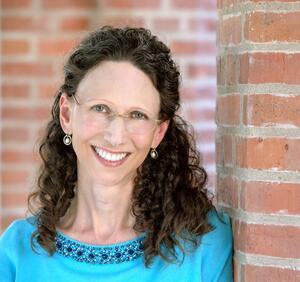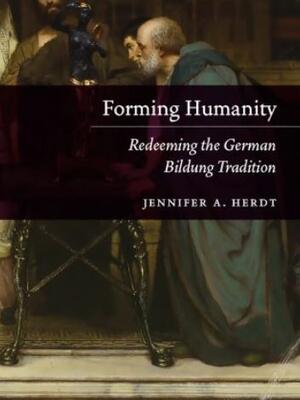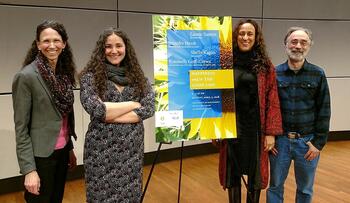Jennifer Herdt is the Gilbert L. Stark Professor of Christian Ethics at Yale Divinity School and, for the past eight years, Senior Associate Dean for Academic Affairs. At the end of the academic year, her service in administration comes to an end and she returns to fulltime faculty duties. YDS sat down with Prof. Herdt to discuss curriculum and teaching changes during the year of crises, as well as her research on ethical formation and the insights gained from her administrative experience.
It has been over a year since the pandemic hit and changed, seemingly, everything. How has this historic event changed the YDS curriculum? Have you or your faculty colleagues created any new courses—or changed existing courses—to address the pandemic directly or indirectly?
 Several Divinity School courses devoted special attention to Christian responses to past plagues—ranging from the History of Medieval Christianity to a course on Natural Disasters in the Christian Tradition taught by Mark Roosien. And I created and taught a new course this past fall on Pandemic Ethics.
Several Divinity School courses devoted special attention to Christian responses to past plagues—ranging from the History of Medieval Christianity to a course on Natural Disasters in the Christian Tradition taught by Mark Roosien. And I created and taught a new course this past fall on Pandemic Ethics. As the COVID-19 pandemic unfolded around us last spring, I could think of little else. Together with other leaders at the School and University, I was busy planning and implementing a radically transformed form of existence for our community. But I also wanted to create a space for reflection on the many ethical questions raised by the pandemic. Early on, we faced issues with scarce medical resources, from respirators to PPE—how were these to be justly allocated? Frontline workers were at high risk of exposure—what were our responsibilities to protect them and their families? Hospitals were keeping out visitors, including clergy—should clergy be free to place themselves at heightened risk in order to serve others’ spiritual needs? We knew that shutting down the economy would create immense economic hardship, but also save lives—how could we ease the economic pain while protecting public health? We realized that communities of color were being hit much harder by the pandemic, amplifying existing structural inequities—how could these inequities be addressed in the short term as well as in the long term? What did this highlight in terms of the inequities of healthcare access in American society?
We also anticipated some of the major issues with which we are wrestling at present: how should vaccines be developed so as to save lives and attend to structural injustices? How can we address vaccine hesitancy rooted in structural inequality and past exploitative practices? What are the responsibilities of wealthy nations to their own citizens, on the one hand, and to the citizens of poorer nations, on the other? And throughout, what distinctive resources and insights do Christians bring to these conversations?
Challenging as it has been to live through this time, I found it empowering to wrestle with these questions in the classroom, rather than trying to bracket them in order to carry on business as usual. And I was joined by a wonderful group of students who threw themselves into presentations and discussions and enriched our conversations by their varying backgrounds and perspectives.
Speaking of curriculum changes, how are YDS curricula and syllabi, not to mention classroom discussions, changing as a result of the racism reckoning that has intensified since George Floyd’s murder last summer?
In the national reckoning with racism that has unfolded in the wake of the murders of Breonna Taylor, George Floyd, and others, we made a commitment as a school to place anti-racism, and Black anti-racism in particular, front and center as a community. One immediate curricular response has been a new course created and taught by Mary Moschella and Joyce Mercer, Interrogating Whiteness. I may be wrong, but I believe that it is the first course in the history of the School to make white privilege its focus. And courses that center Black voices and that grapple with racism, such as Eboni Marshall Turman’s Black Theology and Willie Jennings’s Christianity and the Racial World, among others, are in high demand among students.
Other changes are less visible, but no less profound. The faculty has been gathering throughout the academic year in our various teaching groups to wrestle with the ways in which our disciplines center white European concepts and voices and work to perpetuate white supremacy. Curricular changes already underway have been accelerated: we are thinking not simply of how to include underrepresented voices in our syllabi, but more fundamentally about how to ensure that our modes of inclusion do not simply serve to perpetuate the marginalization of the voices of people of color. This is a conversation not just about what texts we place on our syllabi, and how we organize those syllabi, but also about implicit hierarchies amongst the theological disciplines and about what it means to introduce students to a discipline.
We have gathered, too, for ongoing discussions of Professor Willie Jennings’s book After Whiteness, wrestling with our ideals of intellectual “mastery” and about how these distract us from our calling—a calling to which as members of a theological school we ought to be particularly sensitive—to be formed for community. How can we teach so that every member of the class has a sense of belonging, feels heard and valued for what they bring to our common inquiry? These have been challenging and wonderful conversations, and it is quite remarkable to realize how intensely we have encountered one another in the Zoom world in which all of these conversations have unfolded.
In his Sorensen Lecture to the YDS community earlier this semester, author and columnist David Brooks gave a shout-out to your most recent book, Forming Humanity: Redeeming the German Bildung Tradition, in his lecture on today’s “crisis in moral formation.” What is the German Bildung tradition, and what could its redemption and application mean for America today?
 The intellectuals at the center of the late 18th- and early 19th- century German Bildung tradition, from Herder and Humboldt to Goethe, Schiller, and Hegel, understood Bildung—education, development, ethical formation—to be the central spiritual, ethical, aesthetic, and political task facing their generation. Inheritors of the Christian notion of humanity’s creation in the image of God, they wrestled with what it meant to take responsibility, both individually and collectively, with becoming fully human. In part, they were caught up in social and political movements to extend meaningful forms of participation to ordinary people in determining the conditions of their lives. But they didn’t understand this in terms of empowering individuals to pursue their own interests. Rather, they saw it as freeing persons and communities to live into their humanity, to become more fully realized, capable of entering into richer relationships with one another and of shared pursuit of goodness, truth, and beauty.
The intellectuals at the center of the late 18th- and early 19th- century German Bildung tradition, from Herder and Humboldt to Goethe, Schiller, and Hegel, understood Bildung—education, development, ethical formation—to be the central spiritual, ethical, aesthetic, and political task facing their generation. Inheritors of the Christian notion of humanity’s creation in the image of God, they wrestled with what it meant to take responsibility, both individually and collectively, with becoming fully human. In part, they were caught up in social and political movements to extend meaningful forms of participation to ordinary people in determining the conditions of their lives. But they didn’t understand this in terms of empowering individuals to pursue their own interests. Rather, they saw it as freeing persons and communities to live into their humanity, to become more fully realized, capable of entering into richer relationships with one another and of shared pursuit of goodness, truth, and beauty. I think that we can learn a great deal from their efforts to come to terms with what it means to be human, to be both formed by our communities and societies and history, and to be formers, who shape and re-shape our social inheritance. Part of what this means is that we must constantly grapple with the ways in which our communities—families, friendships, churches, schools, political allegiances, racial identities, national identities—both form and mal-form us. This is hard work, because it involves relinquishing myths of innocence. But I think it can also be inspiring to think with the Bildung tradition, to ask how we today are living into our own humanity, individually and collectively, seeking to become persons capable of courage and honesty and kindness and respect, of building more just and loving practices and institutions and communities. Certainly, I would hope that as we emerge from pandemic isolation, and as we continue to wrestle with white supremacy and structural racism, we will aspire to live into what I call the task of “forming humanity.” We are all silenced when any are silenced, all impoverished when any are impoverished; flourishing is something we can do only together.
As part of a Templeton Foundation initiative, you have embarked on a new project that examines evolutionary anthropology and comparative psychology and whether they leave room for a theological account of human uniqueness and dignity. For those of us who can’t wait to read the results of your inquiry, please give some idea how you answer that fascinating question.
Evolutionary anthropology studies the evolution of human beings in relation to that of other hominids and of non-human primates, while comparative psychology studies human psychology in relation to other primates as well as other animals who have co-evolved with human beings. My project is less concerned with whether these leave room for a theological account of human uniqueness and dignity than with how our conceptions of human dignity and uniqueness might be transformed by this kind of evolutionary and comparative perspective. Theologically speaking, I take it that each life form is unique and that each has its own proper dignity. That dignity and uniqueness ought to be respected and honored by those creatures who have moral agency and who therefore are responsible for their doings. As far as we know, that’s us—human beings. We are the responsible creatures—and we have certainly made a mess of things, in part because of our tendency to detach ourselves from our imbrication with all of the myriad life forms in and through which we flourish.
 But in any case, a fascinating revolution is taking place within evolutionary anthropology and related disciplines. The old Darwinian vision of “survival of the fittest” has given way to an understanding of evolution in which cooperation takes center stage. We are starting to see human beings as distinguished by our hyper-cooperativity, which is associated with the development of both language and morality, as well as the emergence of complex culture and large-scale societies. This hyper-cooperativity has a dark side as well, insofar as we identify strongly with in-groups while excluding out-groups from the scope of empathy and moral concern. My project is concerned with thinking all of this through theologically. Stay tuned!
But in any case, a fascinating revolution is taking place within evolutionary anthropology and related disciplines. The old Darwinian vision of “survival of the fittest” has given way to an understanding of evolution in which cooperation takes center stage. We are starting to see human beings as distinguished by our hyper-cooperativity, which is associated with the development of both language and morality, as well as the emergence of complex culture and large-scale societies. This hyper-cooperativity has a dark side as well, insofar as we identify strongly with in-groups while excluding out-groups from the scope of empathy and moral concern. My project is concerned with thinking all of this through theologically. Stay tuned!For the past eight years, you have served as Senior Associate Dean for Academic Affairs at YDS, a position from which you are stepping down at the end of June. What comes next? What has the administrative experience meant to you as an educator and scholar?
In July, I will begin a year of research leave as part of my involvement with the Templeton Collaborations in Theological Anthropology project, working on my own research as well as mentoring several other more junior colleagues and participating in conferences with all of the other researchers. After that, I look forward to resuming full-time teaching.
During my eight years as Senior Associate Dean for Academic Affairs, I have continued to teach, but I haven’t been able to develop as many new courses or teach as much as I would like. I look forward to developing a new course in Animal Ethics, for example. I know that my ongoing work as a teacher-scholar will be deeply informed by the time that I have spent on the administrative side of things. I have a much fuller and deeper appreciation for the distinctive identity and mission of YDS than I did eight years ago. It is easy for academics to focus on their own sub-field and the students in that immediate sub-field. I now think much more about the good of the school as a whole, as well as its distinctive place within the ecology of Yale and amongst other institutions of theological education. I also have a fuller appreciation for our student body, the rich array of identities and backgrounds and vocations that are represented in our midst and from which I am constantly learning. Given my leadership role I have made a priority of attending chapel, and I have come to treasure it as a space in which forms of worship, and forms of community, are constantly being imagined and re-imagined—not least in these COVID times.
Bryce Tapp ’22 M.A.R. contributed to this article.
April 21, 2021